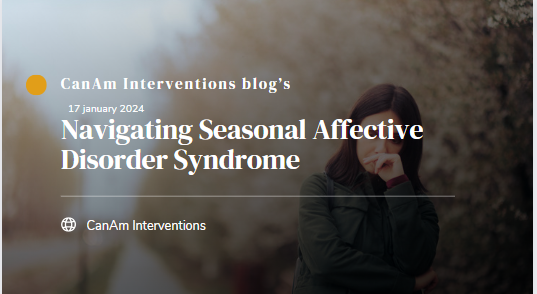NAVAGATING SEASONAL AFFECTIVE DISORDER SYNDROME (SADS)
Winter is a difficult time for many people – dark mornings, early sunsets, and of course, the frigid temperatures. You don’t have to have Seasonal Affective Disorder to get the “cold weather blues.” Anyone can struggle with a dip in their mood when there’s a dip in the temperature. And with the added challenges of COVID-19, this impact on mental health may be harder on many. We can’t change the weather – but we can change our reaction to it. Can-Am has prepared some suggestions to help get you through these challenging winter moods.

We can’t prevent Mother Nature – but we can prepare for it.
With temperatures starting to drop, we’re all dreading its shift to winter. One of the best things you can do to face a potential challenge is to prepare for it. Start thinking about how you can adapt your routines to continue doing the things that promote your mental and physical health.
Here are some tips that can help:
1. Stock up on supplies for your hobbies.
Do some of your hobbies include running or cycling to stay active? Or perhaps you enjoy baking or practicing an instrument? Make sure you have the supplies/gear you need a few months ahead of time. This could be investing in a new mixer or cookbooks, or getting some colder-weather sportswear to continue outdoor exercise. Winter doesn’t have to stop you from doing what you enjoy or staying active. Do a bit of prep now, so you can keep the momentum going in the months ahead.
2. Stave off loneliness by staying connected.
It can be easier for us to make excuses not to see, or talk to, loved ones when we’re feeling more lethargic or down because of gloomier weather. Try to prioritize maintaining your connections with family and friends. This could be through meeting up or by phone/online. This will give you have a solid support system to lean on when you are stressed or down.
3. Reflect and be flexible.
Over the summer, many of us have happily adapted to new ways of socializing and staying active – park visits, backyard BBQs, gardening, cycling a new trail. Yes, we can’t do these things when winter hits. But, we go through this every year – and every year we find ways to cope. Think of some wonderful winter memories. What were you doing? Can you do more of that now? Were there things you did in the cooler months that worked well for you? Reflect on healthy coping strategies that work for you – and be adaptable to making it work despite current challenges. Try getting a few friends together for a group chat to brainstorm ideas for winter-themed events, or do some research into how to move your hobbies inside. Seems like a great way to complete some -do it yourself- projects around the house, or to take an online course on a subject that interests you.
4. Maintain balance.
Our health is hinged on taking care of ourselves, which includes eating balanced meals, exercising regularly, proper sleep and managing stress. Keep an eye on how your routines shift during this time. Maybe you exercise less, and watch more TV. That’s ok. Pay attention to it and try to take a few small steps to address any imbalances early on, like adding 20 to 30 minutes of exercise or yoga, or reaching for a book when you want to reach for the remote.
We can do this!
This year, the season’s change may feel harder. You may dread it more than any other year. Try to keep your spirits up. Soak up the lovely crisp air, and start thinking on ways to help you cope during the colder months ahead. Most of all, stay positive – a good mindset now will put you in the best position to cope with colder weather and shorter days. We at Can-Am strive to promote healthy living and to urge people to step outside their comfort zones to exercise these necessary methods that will help them achieve the mental and physical health parameters needed for sustaining a happy and healthy life. We are here to help further your quest for a better life and to guide any individuals that seek help to obtain healthy habits that support your goals.
E: patti.pike@canaminterventions.com W: www.canaminterventions.com
1-800-638-1812 Toll Free Internationally
415-827-3725 Cell /Text
415-578-2875 Office